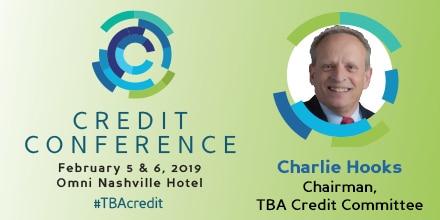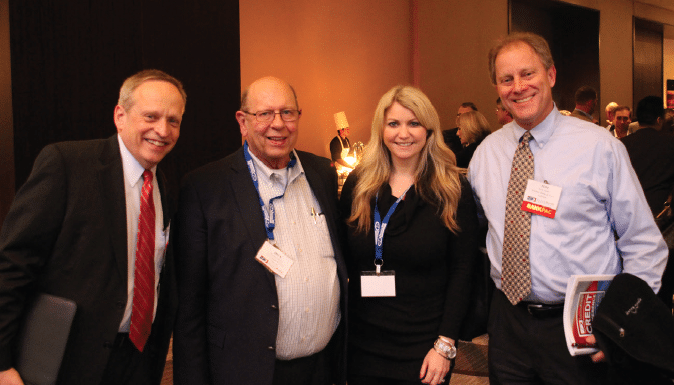Q&A with Charlie Hooks
Chairman, Credit Committee, Tennessee Bankers Association
EVP/Chief Credit Officer, Sumner Bank & Trust, Gallatin, Tenn.
A Kentucky native and Western Kentucky University graduate, Charlie Hooks has been a Nashville banker since 1981. After starting out with Commerce Union Bank, Hooks has spent time at Nashville City Bank, The Bank of Nashville, and First Advantage Bank. Today, he is EVP/CCO of Sumner Bank & Trust in Gallatin. As the Credit Committee chairman, he has been hard at work with his fellow committee members preparing for one of TBA’s most anticipated events—Credit Conference. Hooks spoke with The Tennessee Banker about his career, the banking industry, and Credit Conference, which takes place February 5 and 6.

What led you into the banking industry?
Growing up in Cadiz, Ky., (a town of 2,500 that is part of the Clarksville, Tenn., MSA), my mother worked at the local community bank, so I was familiar with the employees and owners. Most of the employees had been working there since they graduated either from high school or college. At that time, as a young boy, it looked like a stress-free job you could have for life. Growing up in the 60s and 70s is a lot different than today, and the banking industry is anything but stress free, but it has been my career path for almost 40 years. I still enjoy the challenges and opportunities it presents.
During your career, you’ve seen energized economies and a few credit downturns. As this recovery cycle continues on to the point of nervousness about the next dip, what do you see as the leading principle bankers need to keep in mind to ensure they weather the storm?
This is the time in the business cycle that CCOs earn their keep. Over the past several years in Middle Tennessee, we have been able to meet our production goals, while keeping asset quality at uncommonly high levels. From my viewpoint, I see the economy in Middle Tennessee cooling somewhat, with too many banks chasing too few deals. Bankers need to stay true to their course in making sure the borrower has equity in the projects with a strong EBITDA, and at same time, not lengthening the amortization to help DSC calculation. Today’s lending environment is getting tighter and we hear “everybody else is doing it,” from lenders and management, but if banks compromise their core values, they ultimately expend their time, energies, and resources purely in collection mode.
Located just 25 miles northeast of Nashville, Sumner County—in particular Gallatin and Hendersonville—is clearly benefiting from Music City’s boom of development. With that rapid growth, the county also has large areas that have maintained more rural roots. What do you see as the leading economic opportunities and challenges facing your county?
Summer Bank & Trust is a real estate lender. We have benefited from the strong growth of Nashville and Middle Tennessee over the past several years. The residential construction market has been strong, along with the 1-4 rental market, and we see that trend continuing. The challenge in the Middle Tennessee area is the availability of lots for small builders to secure. It is increasingly difficult for them to compete with the large national builders that are able to acquire large tracts. Consequently, the larger builders are also recruiting and hiring skilled craftsmen needed for job sites, which creates thinner profit margins for our model customer.

Charlie Hooks with Dick Bobo, Melissa Whelan, and Tom Kern at TBA's 2017 Credit Conference
As chair of the Credit Committee, you oversee the Credit Conference, which over the years has become the most attended event by Tennessee bankers. For bankers who haven’t attended before, what would you say to encourage them to participate this year?
The Committee has worked diligently to develop a conference that looks at our lending environment today but also explores what lenders and management can expect in the coming year. If you have not previously attended, you will be given ideas of how to review your current loan portfolio for risk, along with various new options on how to diversify and expand your portfolio, while minimizing risk. The breakout sessions are structured to reach all community bankers, regardless of demographics, and help them understand their environment better. Lastly, the opportunity to network with folks from across the state who do the same things as you do, day in and day out, is beneficial on so many levels. I would encourage you to certainly take advantage of that. If this is your first year to attend the Credit Conference, I would like to meet you, so please seek me out or any committee member. We value what you think of the conference because it is “your conference.”
